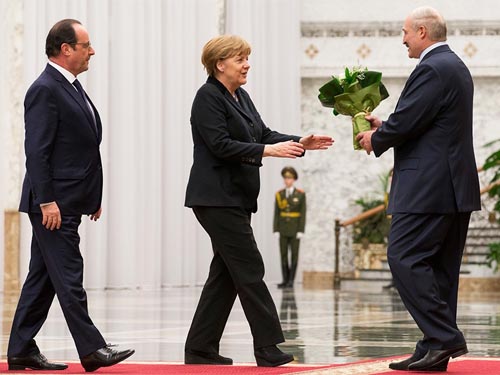Poland and Germany were both initiators and drivers of a New Eastern policy linked to the Eastern neighborhood and Russia/Soviet Union.
Ulad Vialichka: Absence of election institute in Belarus doesn’t coincide with the EU assessments

If nothing extraordinary happens in Belarus, the EU will get a possibility to build relations with the re-legitimized president by results of the presidential campaign.
The official Minsk hopes that EU sanctions will be abolished. As EuroBelarus Information Service mentioned earlier, Reuters with the reference to diplomatic sources informed about the possible lift of a number of sanctions against Belarus, including the ban on entering the EU put upon Alexander Lukashenko.
Is it possible? Ulad Vialichka, the head of the International Consortium “EuroBelarus”, answered the questions of the EuroBelarus Information Service.
— Is there a chance that sanctions will be lifted or frozen before the end of the presidential campaign in Belarus?
— I think that it’s hardly possible: there is no sense and no grounds for lifting sanctions before the so-called “presidential campaign”. It is most likely that the decision about sanctions will be taken after October 11.
— Lukashenko pardoned political prisoners by fulfilling one of the 12 demands of the EU. Is it enough for lifting (or freezing) the sanctions?
— However strange, it is enough for nulling the relations between Belarus and the EU. Minimal democratization of the election process will be an additional condition that the EU will record unless some force majeure happens. However, such actions are caused by external factors, not internal changes. All in all, both the EU and other actors are ready to work with problems of democracy in Belarus in the long-term perspective. Accordingly, completeness of relations with the acting authorities is needed for that.
What can return this completeness? Removal of the most problematic issue, by which I mean the release of the political prisoners and relative legitimacy of the authorities that can be reached after October 11. Absence of election institute in Belarus as such for the majority of our fellow citizens doesn’t coincide with the EU assessments since the EU looks at the situation more formally and ignores many negative phenomena — non-freedom of mass media, light repressions against independent civil and political forces, and so on. Thus, unless arrests, detentions, or other scandals happen, both these factors are likely to play in favor of unfreezing the official Belarus-Europe relations.
— Will the absence of brutal situations serve as a reason for Lukashenko’s recognition?
— A lot depends on the situation after October 11. Unless something extraordinary happens in Belarus, the EU will get a possibility to build relations with the re-legitimized president by results of the presidential campaign. De facto, Europe has already been dealing with the current authorities; so Belarusan authorities see benefits from their legitimation that they can get on October 11. No one cares that the whole election institute is falsified in Belarus.
— Will the abolition of sanctions open road for “normalization of our relations with the EU”, just like our Foreign Ministry is trying to convince everyone?
— It depends on our understanding of normalization of relations. If we are talking about the possibility for officials to take part in all status events, then abolition of sanctions will open road for that. But if by normalization of relations we mean partnership, certain agreements, and mutually beneficial cooperation based on shared values, we can hardly count on that. For such normalization we need to change the actions of the authorities, principles of decision-making, and priorities of external and internal policy. However, everything demonstrates that we cannot expect changes. A mere cosmetic, ritual normalization is taking place, which will provide the EU with a possibility to communicate with the higher Belarusan officials not using the half-official format but using a real one. De facto, we cannot expect super-activation of bilateral relations at some new level.
— Foreign Ministry is talking about the possible thaw in Belarus-EU relations while negotiations about deploying a Russian airbase in Belarus are going on. Is the thaw of bilateral relations possible in situation of Russian military expansion?
— I think that Belarus-EU relations will be developing regardless of the military base issue. The question is how the situation is presented for the EU. I think that Belarusan diplomats present negotiations about the base as an involuntary measure; so this factor won’t have serious influence on the near future of Belarus-Europe relations, but rather will be viewed in the general frames of common-European and international security. Belarus has already been engaged in a military alliance with Russia within CSTO, and presence of alien military bases at the Belarusan territory only makes the situation worse.
Nevertheless, I don’t think that this factor can undermine the process of unfreezing Belarus-Europe relations.
Others
-
Uladzimir Matskevich: The sooner the "Union State" is denounced, the better for Belarus
Not only does the “Union State” undermine the establishment of civilized relations with Europe, but it hinders the possibility of normal relations between Belarus and Russia.
-
Uladzimir Matskevich: The regime can no longer control the situation in the country
The authorities are unable to prolong the social contract with the people: there is no way out of the social crisis.
-
Press release of the BNP in connection with the next round of the dialogue in the format of the EU-Belarus Coordination Group
Belarusan National Platform of the Eastern Partnership Civil Society Forum welcomes the dialogue process in the format of the EU-Belarus Coordination Group, the third round of which was held in Minsk on 3-4 April 2017.
-
Hennadiy Maksak: Europe must react adequately to the events in Minsk
A new wave of political repressions should make the EU return to tougher policy towards the Belarusan regime.








Comments
From farewell to a new Eastern policy and towards a new development
Poland and Germany were both initiators and drivers of a New Eastern policy linked to the Eastern neighborhood and Russia/Soviet Union.